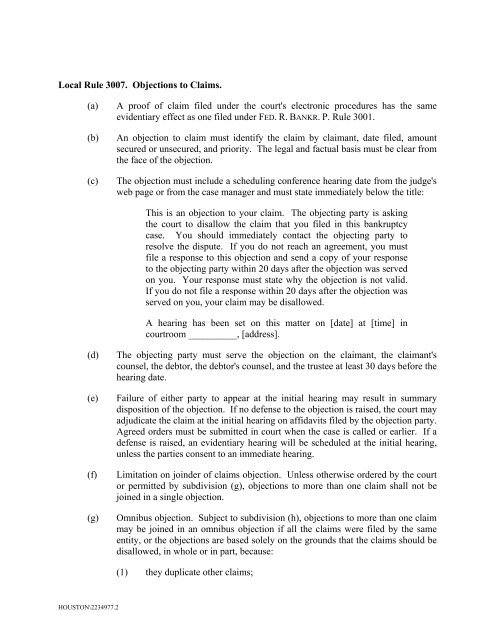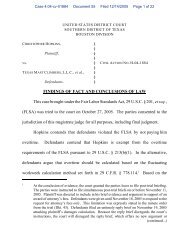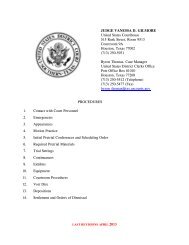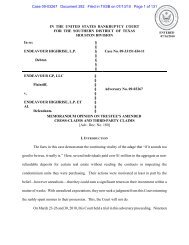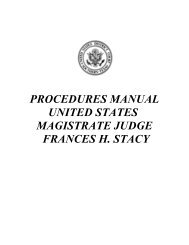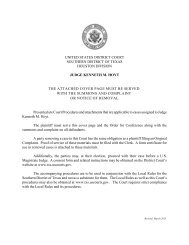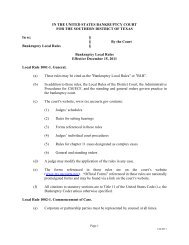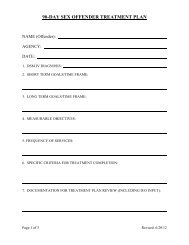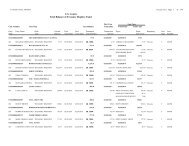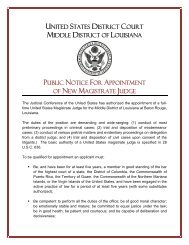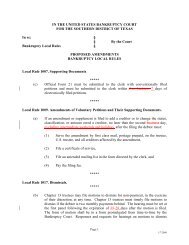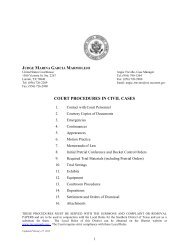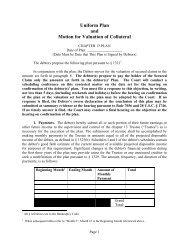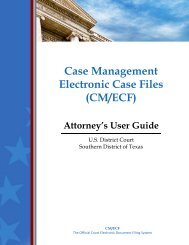Local Rule 3007. Objections to Claims. (a) A proof of claim filed ...
Local Rule 3007. Objections to Claims. (a) A proof of claim filed ...
Local Rule 3007. Objections to Claims. (a) A proof of claim filed ...
You also want an ePaper? Increase the reach of your titles
YUMPU automatically turns print PDFs into web optimized ePapers that Google loves.
<strong>Local</strong> <strong>Rule</strong> <strong>3007.</strong> <strong>Objections</strong> <strong>to</strong> <strong>Claims</strong>.(a)(b)(c)A <strong>pro<strong>of</strong></strong> <strong>of</strong> <strong>claim</strong> <strong>filed</strong> under the court's electronic procedures has the sameevidentiary effect as one <strong>filed</strong> under FED. R. BANKR. P. <strong>Rule</strong> 3001.An objection <strong>to</strong> <strong>claim</strong> must identify the <strong>claim</strong> by <strong>claim</strong>ant, date <strong>filed</strong>, amountsecured or unsecured, and priority. The legal and factual basis must be clear fromthe face <strong>of</strong> the objection.The objection must include a scheduling conference hearing date from the judge'sweb page or from the case manager and must state immediately below the title:This is an objection <strong>to</strong> your <strong>claim</strong>. The objecting party is askingthe court <strong>to</strong> disallow the <strong>claim</strong> that you <strong>filed</strong> in this bankruptcycase. You should immediately contact the objecting party <strong>to</strong>resolve the dispute. If you do not reach an agreement, you mustfile a response <strong>to</strong> this objection and send a copy <strong>of</strong> your response<strong>to</strong> the objecting party within 20 days after the objection was servedon you. Your response must state why the objection is not valid.If you do not file a response within 20 days after the objection wasserved on you, your <strong>claim</strong> may be disallowed.A hearing has been set on this matter on [date] at [time] incourtroom __________, [address].(d)(e)(f)(g)The objecting party must serve the objection on the <strong>claim</strong>ant, the <strong>claim</strong>ant'scounsel, the deb<strong>to</strong>r, the deb<strong>to</strong>r's counsel, and the trustee at least 30 days before thehearing date.Failure <strong>of</strong> either party <strong>to</strong> appear at the initial hearing may result in summarydisposition <strong>of</strong> the objection. If no defense <strong>to</strong> the objection is raised, the court mayadjudicate the <strong>claim</strong> at the initial hearing on affidavits <strong>filed</strong> by the objection party.Agreed orders must be submitted in court when the case is called or earlier. If adefense is raised, an evidentiary hearing will be scheduled at the initial hearing,unless the parties consent <strong>to</strong> an immediate hearing.Limitation on joinder <strong>of</strong> <strong>claim</strong>s objection. Unless otherwise ordered by the cour<strong>to</strong>r permitted by subdivision (g), objections <strong>to</strong> more than one <strong>claim</strong> shall not bejoined in a single objection.Omnibus objection. Subject <strong>to</strong> subdivision (h), objections <strong>to</strong> more than one <strong>claim</strong>may be joined in an omnibus objection if all the <strong>claim</strong>s were <strong>filed</strong> by the sameentity, or the objections are based solely on the grounds that the <strong>claim</strong>s should bedisallowed, in whole or in part, because:(1) they duplicate other <strong>claim</strong>s;HOUSTON\2234977.2
(h)(i)(2) they have been <strong>filed</strong> in the wrong case;(3) they have been amended by subsequently <strong>filed</strong> <strong>pro<strong>of</strong></strong>s <strong>of</strong> <strong>claim</strong>;(4) they were not timely <strong>filed</strong>;(5) they have been satisfied or released during the case in accordance with theCode, applicable rules, or a court order;(6) they were presented in a form that does not comply with applicable rules,and the objection states that the objec<strong>to</strong>r is unable <strong>to</strong> determine the validity<strong>of</strong> the <strong>claim</strong> because <strong>of</strong> the noncompliance;(7) they are interests, rather than <strong>claim</strong>s; or(8) they assert priority in an amount that exceeds the maximum amount under§ 507 <strong>of</strong> the Code.Requirements for omnibus objection. An omnibus objection shall:(1) state in a conspicuous place that <strong>claim</strong>ants receiving the objection shouldlocate their names and <strong>claim</strong>s in the objection;(2) list <strong>claim</strong>ants alphabetically, provide a cross-reference <strong>to</strong> <strong>claim</strong> numbers,and, if appropriate, list <strong>claim</strong>ants by category <strong>of</strong> <strong>claim</strong>s;(3) state the grounds <strong>of</strong> the objection <strong>to</strong> each <strong>claim</strong> and provide a crossreference<strong>to</strong> the pages in the omnibus objection pertinent <strong>to</strong> the statedgrounds;(4) state in the title the identity <strong>of</strong> the objec<strong>to</strong>r and the grounds for theobjections;(5) be numbered consecutively with other omnibus objections <strong>filed</strong> by thesame objec<strong>to</strong>r; and(6) contain objections <strong>to</strong> no more than 100 <strong>claim</strong>s.Exhibits.(1) Each exhibit attached <strong>to</strong> an Objection shall include, at a minimum, theinformation identified in the following table, with such informationentered in the respective boxes as appropriate:(1)Name <strong>of</strong> Claimant(2)Claim Number(3)Claim Amount(4)Reason for Disallowance(2) Each exhibit shall contain only those <strong>claim</strong>s <strong>to</strong> which there is one commonbasis for objection (e.g., exhibit A duplicate <strong>claim</strong>s; exhibit B amended orsuperseded <strong>claim</strong>s).-2-
(1)Name <strong>of</strong> Claimant(3) A <strong>claim</strong> for which there are two or more bases for objection (e.g., a <strong>claim</strong>that is both duplicative and late <strong>filed</strong>) shall be referenced on eachapplicable exhibit.(4) Each exhibit shall have the <strong>claim</strong>s listed alphabetically by the last name <strong>of</strong>the <strong>claim</strong>ant (in the case <strong>of</strong> an individual) or the name <strong>of</strong> the entity (in thecase <strong>of</strong> a corporation, partnership, limited liability company, etc.).(5) If an Objection seeks <strong>to</strong> reduce the amount <strong>of</strong> a <strong>claim</strong>, a column shall beadded between columns (3) and (4) titled "Modified Claim Amount" andcolumn (4) shall be changed from "Reason for Disallowance" <strong>to</strong> "Reasonfor Modification."(2)Claim Number(3)Claim AmountModified ClaimAmount(4)Reason forModification(6) If an Objection seeks <strong>to</strong> change the classification <strong>of</strong> a <strong>claim</strong>, two columnsshall be added between columns (3) and (4) titled "Claim ClassificationStatus" and "Modified Classification Status" and column (4) shall bechanged from "Reason for Disallowance" <strong>to</strong> "Reason for Reclassification."(1)Name <strong>of</strong>Claimant(2)ClaimNumber(3)ClaimAmountClaimClassificationStatusModifiedClassificationStatus(4)Reason forReclassification(7) If an Objection seeks <strong>to</strong> change the priority <strong>of</strong> a <strong>claim</strong>, two columns shallbe added between columns (3) and (4) titled "Claim Priority Status" and"Modified Priority Status" and column (4) shall be changed from "Reasonfor Disallowance" <strong>to</strong> "Reason for Modification."(1)Name <strong>of</strong>Claimant(2)ClaimNumber(3)ClaimAmountClaimPriorityStatusModifiedPriorityStatus(4)Reason forModification(8) If an Objection seeks <strong>to</strong> expunge amended or duplicate <strong>claim</strong>s, the title <strong>of</strong>column (2) shall be changed from "Claim Number" <strong>to</strong> "Remaining ClaimNumber" and a column shall be added between columns (2) and (3) titled"Duplicate or Amended Claim <strong>to</strong> be Expunged."(1)Name <strong>of</strong>Claimant(2)Remaining ClaimNumberDuplicate orAmended Claim <strong>to</strong>be Expunged(3)Claim Amount(4)Reason forDisallowance-3-
(9) If an Objection seeks <strong>to</strong> expunge late <strong>filed</strong> <strong>claim</strong>s, a column shall be addedbetween columns (1) and (2) titled "Date Claim Filed."(1)Name <strong>of</strong>ClaimantDate ClaimFiled(2)Claim Number(3)Claim Amount(4)Reason forDisallowance(j)(k)(10) Where the Objection is based on substantive grounds, the exhibit mustinclude a <strong>claim</strong>-specific declaration in the column titled "Reason forDisallowance" giving sufficient detail as <strong>to</strong> why the <strong>claim</strong> should bedisallowed. The following are examples <strong>of</strong> "sufficient detail" necessary <strong>to</strong>sustain an Objection on a substantive basis:(a) If the <strong>claim</strong> is against a non-deb<strong>to</strong>r entity, then the non-deb<strong>to</strong>rentity must be identified;(b) If the <strong>claim</strong> has been paid or satisfied prepetition (not postpetition),then the check number and the date the check was issued must beidentified. (An objection <strong>to</strong> a <strong>claim</strong> on the basis that the <strong>claim</strong> hasbeen paid or satisfied postpetition is not a valid objection);(c) If the <strong>claim</strong> includes a postpetition <strong>claim</strong>, then the date thepostpetition <strong>claim</strong> arose must be identified; and(d) If the Objection is based on the deb<strong>to</strong>r's lack <strong>of</strong> any books andrecords relating <strong>to</strong> the <strong>claim</strong>, then the objec<strong>to</strong>r must state, byaffidavit or declaration, that the objec<strong>to</strong>r has made reasonableefforts <strong>to</strong> research the <strong>claim</strong> on the deb<strong>to</strong>r's books and records.Pro Se Claimants and Out <strong>of</strong> Town At<strong>to</strong>rneys. Any <strong>claim</strong>ant may participate prose (and telephonically) at the initial hearing on an Objection <strong>to</strong> his or her <strong>claim</strong> byfollowing the telephonic appearance procedures located on the Court's website.Out <strong>of</strong> <strong>to</strong>wn at<strong>to</strong>rneys may also appear at the initial hearing by telephone withoutthe need <strong>of</strong> local counsel.Hearings on <strong>Objections</strong> in Complex Chapter 11 Cases. Hearings on <strong>Objections</strong>may ordinarily be held on the regularly scheduled omnibus hearing dates inComplex Chapter 11 Cases, consistent with subdivision (e) above and thecomplex chapter 11 rules <strong>of</strong> this district. The parties may also request that aseparate hearing on an <strong>Objections</strong>(s) based on substantive grounds be separatelyscheduled for a date and time convenient <strong>to</strong> the Court and the parties.-4-


